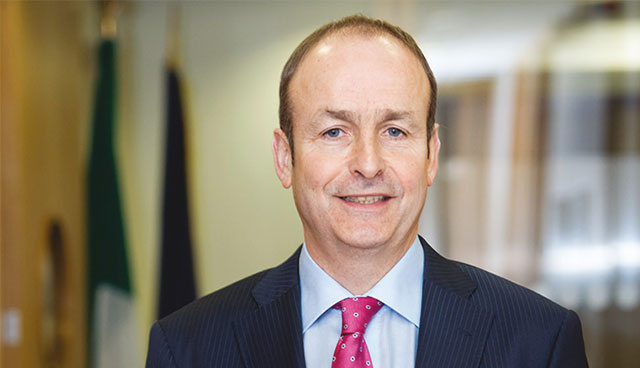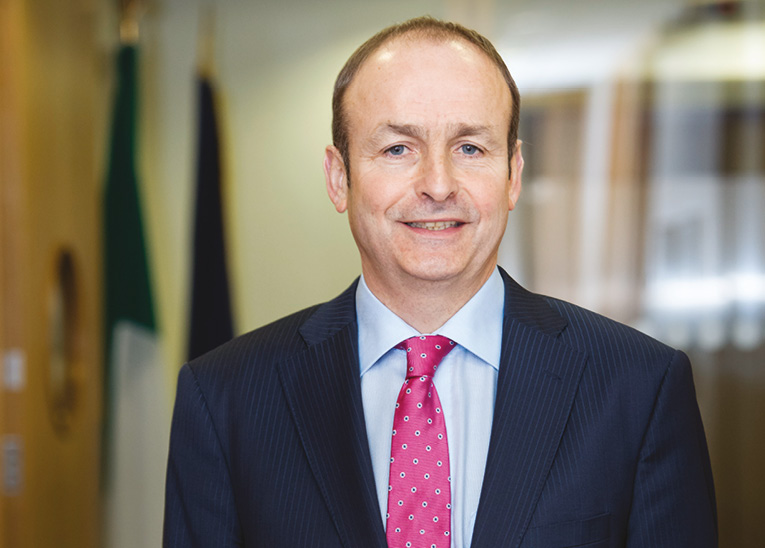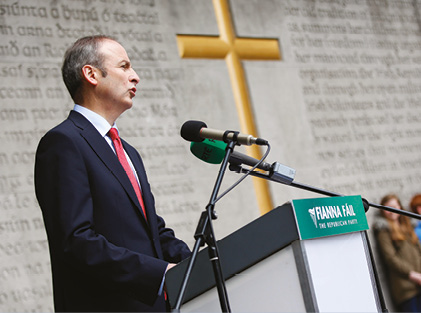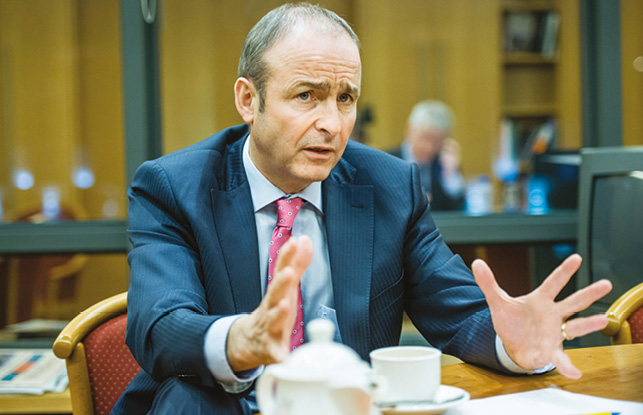Watching and waiting: Micheál Martin, TD


Many had anticipated that following the formation of the minority coalition last year, Micheál Martin would not hesitate to collapse the Government at the first advantageous opportunity. This analysis was a miscalculation and the confidence and supply arrangement has held thus far. Ciarán Galway speaks with the Fianna Fáil leader at the summer adjournment of the Dáil session.
The vista visible from Martin’s office encompasses Leinster Lawn; the focal point of which is a golden flame-tipped obelisk cenotaph, commissioned by party predecessor Éamon de Valera and completed in 1950. Intriguingly, the structure is not a lieu de mémoire for the Soldiers of Destiny. Rather, it bears the names of three icons who personify Fine Gael party mythology: Micheál Ó Coileáin, Art Ó Griobhta and Caoimhghín Ó h-Uigín.
Martin’s line of sight however, despite a fleeting career as a history teacher, is very much set upon the future. Confident and stern, the Cork-man wades into the interview with the deftness of a leader absolutely assured in his determination to restore Ireland’s ‘natural governing party’ to its former glory.
Government performance
Lamenting what he regards as “a wasted year”, Martin is hopeful that the return of the Dáil in the autumn will see renewed focus on delivery and policy implementation. “Since the Government was formed, there has been a lot of internal angst within the Fine Gael party and I think they lost their focus on government,” he asserts.
The Fianna Fáil leader is particularly disappointed with the Government’s performance on ‘big ticket items’ such as housing and health. “There have been very few inroads made in both. In fact, the housing crisis is now the greatest social crisis that we have had in decades.”
In terms of housing, Martin is scathing: “We’ve given the Government adequate time. They have published a Rebuilding Ireland plan under Simon Coveney. Coveney indicated that he had asked for this position and that it was so important that he wanted to take on the challenge. Then within 12 months, he leaves because of the leadership change. I don’t think that’s good enough to be frank.
“Now Eoghan Murphy is coming in to literally review the review. At all levels of the housing situation, including those who want to buy a house, those who need a council house and those who are renting, people are being failed; to such an extent that we have an incredible crisis in the country, particularly in our cities.”
While the Fianna Fáil manifesto suggests the establishment of an agency to drive the housing agenda and build new council houses, Martin outlines: “The most fundamental change that we would make would be to get rid of this ideological hang-up on building council houses and social housing which is at the core of the stasis in housing policy at the moment.
“There is this idea that we shouldn’t build large housing estates again. No one is talking about the re-creation of particular conurbations, but there is nothing wrong with getting on with it. People are currently housed in hotel accommodation. It’s a scandal.”
Similarly, Fianna Fáil is displeased at the Government’s lack of urgency in developing a National Treatment Purchase Fund. “We did put into the confidence and supply agreement that there would be a treatment purchase fund; that we’d bring that back. I think around 400 people have been treated in the last 12 months. Now, they say that they need to recruit people to get it back up and running. We’re giving them the benefit of the doubt on that.
“Meanwhile, your conventional waiting lists are going through the roof. You’ve a crisis in medical man power, in that, within nursing, retention of staff is proving hugely problematic. That whole human resource question in health, I don’t believe that there are enough interventionist policies being implemented to try and arrest that.”
Outlining that the Home Care Package programme should be substantially expanded, Martin’s Fianna Fáil is set to pursue legislation which would create a choice for individuals to avail of a home care package instead of going into a nursing home. “The Government asked us to give them six months on that. We gave them six months and they haven’t even really started the consultation phase. So, we’re going to press ahead with that legislation in the autumn.
“We believe that a radical change needs to take place in terms of the provision of home care packages for our elderly in order to avoid early institutionalisation, but also to give people an opportunity to stay in their own homes for a longer period than they currently are, with the requisite supports.”

“The most fundamental change that we would make would be to get rid of this ideological hang-up on building council houses and social housing which is at the core of the stasis in housing policy at the moment.”
Policing
Speaking on the defeat of Sinn Féin’s motion of no confidence in the Garda Commissioner, Martin robustly defends his party’s position: “People say to us, ‘you didn’t agree to a motion of no confidence in the commissioner’, yet we did a far more effective thing. We made it essential that there should be a Commission on Policing established. I was the first politician to say this in the Republic because I recognised that this is about more than one individual, that a whole template change must occur here.
“Nóirín O’Sullivan is still [Garda Commissioner] because the Government has decided that she stays. They have the power to ensure that, we do not. We have no legislative authority as an opposition party to either hire or fire. That’s the key point.”
While Fianna Fáil has publicly opined that the Commissioner should reconsider her position amidst a series of Garda-related scandals, it affirms that it is unwilling to set a precedent which could potentially expose the Dáil to similar scenarios involving senior civils servants.
Referencing the Garda Síochána Act 2005, which outlines the basis upon which a Garda Commissioner could be removed, he recounts the surrounding depth of deliberation. “It’s a very senior position that goes to the heart of our democracy and the idea that you would overly politicise that position was a situation that the Oireachtas in 2005 was anxious to avoid. Latterly, two years ago, the decision was taken to establish the Policing Authority for the self-same reason; to depoliticise An Garda Síochána.
“The Dáil is not an executive body that should be in the business of deciding who gets a job, who doesn’t get a job or how long they stay in the job. The Act is very clear, the Government may sack a Garda Commissioner or ask a Garda Commissioner to retire, use whatever language you want, for stated reasons. The Policing Authority also have the authority to do that in certain circumstances. I accept that policy and that’s where we are.”

“I disagree strongly with Sinn Féin utilising Brexit as a basis for its own electoral mandate to be frank. It’s gone back to base, using Brexit to drive a unity agenda and the two are not related in my view. Certainly not yet… If you were intelligent you would allow things to evolve.”
Brexit
In relation to Brexit, the opposition leader is also sceptical of the British Government’s coherence on the issue. “The general election has thrown up a new dynamic. A lot will depend on the Conservative Party’s internal politics. Then you have the conflicting elements of the Scottish Conservatives, Labour, the Lib Dems and moderate Conservatives, who are remainers. All of that is creating a mix that renders it very difficult for Europe to deal with Britain and also for Britain to come out with a coherent voice. That is a big worry for us.”
Arguing the case for the appointment of a Minister for Brexit, Martin notes that the introduction of Stephen Donnelly as Brexit spokesperson has already added value to the party’s offering on Brexit. “Of course [ministers] have a focus on Brexit, but it’s not an exclusive focus and you need someone in government who is 24/7 thinking of nothing else but Brexit, working with all the departments, pulling their threads together and also keeping the pressure on to ensure movement and momentum on solutions.”
Acknowledging the success of Ireland’s diplomatic effort to create an awareness around the uniqueness of the Irish position at a European level, he contends that this needs to be followed up with solutions to identified challenges. “Sector by sector we need to produce solutions to problems that we foresee and these must be presented to Brussels. Secondly, and I have been arguing this for two years, even before Brexit, I don’t think that we have scaled-up the public service to the degree that we should have, especially in terms of dealing with Brexit.
“Market diversification is going to be essential. Yet even in relation to posts that have been sanctioned for Enterprise Ireland, for the IDA, for Bord Bia and various other agencies; they haven’t been filled. It’s very difficult to comprehend why we haven’t put the additional resources into the various agencies who will be at the forefront of the battle on Brexit.”
The North
Post-Brexit, the Fianna Fáil vision for a special status in the North incorporates a free-trade zone on the island of Ireland and continued access to European programmes, including education and research. “Essentially you are looking at a unique solution that almost encompasses the dual status of Northern Ireland. There are large urban conurbations in the North which are very disadvantaged and reflect some of the poorest regions in Europe, so I do believe that there is a potential European dimension in terms of socio-economic policy and investment that could help.
“I think there is a general empathy with the North. My worry is that there may be a tendency in Europe to grow tired of the whole Brexit thing and want to get on with other things. There is some evidence of a hardening of positions in Germany and France on some of these issues, so I’d be slightly concerned that the longer it drifts out, things may not work out as well as we might like.”
Martin feels that his analysis of the collapse of the northern Executive as an electoral ploy has been vindicated. “It was meant to be about a Renewable Heating Incentive, yet the latest round of talks have moved off this and we’re now dealing with a language as a reason why we can’t bring back the Executive. I worry about the politicisation of the language as a speaker myself and as someone who is committed to the Irish language.
“The most worrying aspect is, prior to the collapse of the Executive, [the parties] were actually developing a degree of coherence on Brexit, a practical one, notwithstanding the DUP being Brexiteers. They were beginning to use the Executive and the North-South Ministerial Council as a vehicle to try to create a coherent viewpoint. They’ve lost that in the last nine months and that’s a great concern.”
“We support a united Ireland. A border poll to me isn’t a united Ireland. A border poll is divisive.”
Preparing for unity
On the issue of Irish reunification, Martin argues that the Government’s first priority must be to focus on implementing the Good Friday Agreement. “I disagree strongly with Sinn Féin utilising Brexit as a basis for its own electoral mandate to be frank. It’s gone back to base, using Brexit to drive a unity agenda and the two are not related in my view. Certainly not yet. I think it’s creating a wedge with unionism and loyalism. If you were intelligent you would allow things to evolve.”
Dismissing a border poll as majoritarianism by another name, he suggests that such a referendum would have inevitably failed if called in recent years. “There was no blueprint created, no one knew what they meant by a ‘united Ireland’, no one still knows what they mean by a ‘united Ireland’. We support a united Ireland. A border poll to me isn’t a united Ireland. A border poll is divisive and puts 48 per cent in their box and tells them to lie down.”
He also contends that the full potential of Strand Two of the Good Friday Agreement has not yet been realised. “Sinn Féin have really not got engaged on North/South [and] the DUP have been very slow on that side of it. Three years ago, I put forward a template for how we could devise new bodies on North/South. For instance, I believe there should be one Enterprise Ireland on the island to promote indigenous enterprise. But what we’re getting now is a hardening or polarisation where it’s a border poll or nothing, where it’s unity or nothing and if you don’t agree then there’s something wrong with you.”
Alluding to the progress being made by Fianna Fáil’s working group on Irish unity (“we hope they will be publishing that maybe towards the end of the year”), Martin is unequivocal: “The Good Friday Agreement is the template, no matter what you have in the future.
“The three-stranded relationships will continue. We’re going to have two parliaments on the island of Ireland, because I think the North, given its evolution, is one where you’re going to have a sharing of power through an Executive and an Assembly. I prefer an evolutionary pathway to building relations on the island of Ireland, because unity is about people, it is not about territory.”
Concluding the discussion, Martin verbalises his party’s current status: “We’ve made great progress since 2011. We’re on a journey of renewal and recovery. We’re a party that wants to be rooted in every community, to ensure a strong social democratic ethos in terms of fairness and decency, that working people will be looked after, that vulnerable are protected in our society, that there is equality of opportunity and that a true meritocracy exists in our country.”





